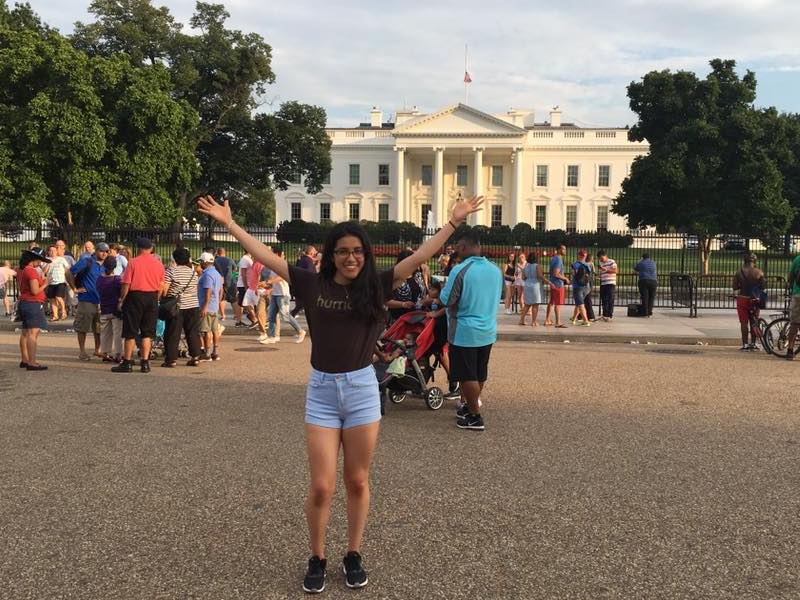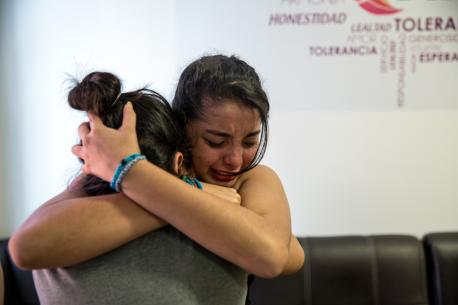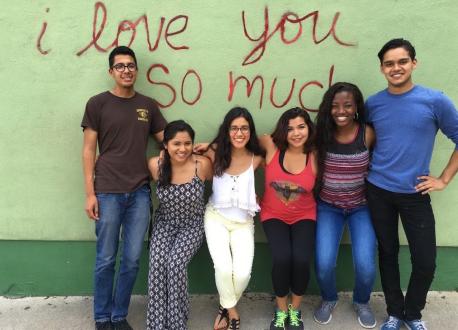
For the Undocumented, an End to DACA Can Mean a Dream Denied
"I have hope that I'll be able to graduate from college, work and live the life everyone else gets to live — without fearing deportation." — University of Texas at Austin pre-law student and DACA recipient Mayte Lara Ibarra
Nineteen-year-old Mayte Lara Ibarra is a pre-law student at the University of Texas at Austin. She was valedictorian of her high school class.
She is also one of nearly 800,000 children of immigrants whose fate hangs in the balance.
Before they were old enough to make their own choices, they were brought into the United States by their parents. Their parents had many reasons for fleeing: extreme poverty, gang warfare, a crippling lack of opportunity. They did it to save their children's futures. Those children have since put down deep roots in their adoptive home. And, since 2012, their inclusion in the Deferred Action for Childhood Arrivals (DACA, or the Dream Act) has allowed these “Dreamers” to live full, productive lives in the U.S. without the threat of deportation.

Valedictorian of her graduating class at David Crockett High School in Austin, Texas in 2016, DACA recipient Mayte Lara Ibarra earned a full-tuition scholarship to the University of Texas at Austin. A recent survey of DACA recipients showed that 45 percent are in school, and of those, 72% are pursuing a bachelor's degree or higher.
On September 5, DACA recipients, now between the ages of 16 and 35, learned that they may no longer be protected. Heated discussions ensued from the White House to the Halls of Congress, from classrooms to family dining tables, and from delis to water coolers: What should be done about the Dreamers?
The U.S. is their home. They’re attending school, going to work, building careers, raising children and plotting futures for the betterment of their families and their communities. Many, like Mayte (pictured in photo at top, third from left), who was born in the central Mexican city of Guanajuato, have no memory of their country of origin. Yet they are now staring down the very real possibility that they will have to leave the only home they have ever known.
If Congress doesn’t act to protect Dreamers, many will lose access to education and work, and they may be deported. Many families will be torn apart because they are of mixed status, with some family members documented, some not. In a 2015 online survey, a quarter of DACA participants said they had a child who is a U.S. citizen. What will become of these children if their parents are deported?
What will become of young people like Mayte, still striving to make the most of the chances they’ve been given while fearing it could all be snatched away?
DACA's protections made Mayte's life easier, even gave her the confidence to reveal her background to the world. But DACA's uncertain future has thrown her own future — and her sense of well-being — into a tailspin.
Below, Mayte shares what it was like to grow up feeling like an average Texas teen, only to discover she was anything but.
You were 3 years old when you left Mexico for the U.S. What do you remember about the journey?
MAYTE LARA IBARRA: I don’t remember anything. My uncle, a U.S. citizen, drove my sister and me over the border in a car. I think it was pure luck that the immigration officials at the border didn’t ask about the young kids in the back seat.
What do you remember about Mexico?
MAYTE LARA IBARRA: I don’t remember anything. I don’t know what my hometown looks like. I don’t remember what my house looked like. I’ve never been back.

Ibarra, above left at age 5 with her older sister, grew up in Texas. She has no memory of Mexico, where she was born. She hasn't been there since she was 3 years old. "I don’t remember anything. I don’t know what my hometown looks like. I don’t remember what my house looked like. I’ve never been back."
When the DACA program was implemented in 2012, how quickly did you apply?
MAYTE LARA IBARRA: I was about 14, and I didn’t understand what DACA meant. I knew I was born in Mexico, but I didn’t understand that it was a big deal that I wasn’t a citizen. Every morning at school, I said the Pledge of Allegiance. I always felt like I was an American. But my mom understood. She pushed me to apply for DACA because she knew I would need it in the future. I have DACA status now, and I’m really thankful to my mom.
Every morning at school, I said the Pledge of Allegiance. I always felt like I was an American.
What does DACA do for you?
MAYTE LARA IBARRA: DACA isn’t perfect. It has a lot of flaws, but it does grant us an authorization so that once we’re old enough to work, we don't have to work under the table.
Another advantage is that it allows us to apply for Advance Parole if we need it. That means that we can leave America for a period of time for educational or humanitarian reasons — like if a family member died — as long as you come back when they say so.
DACA also opens up scholarship options. I remember my senior year of high school, when I was frantically trying to find scholarships, I qualified for maybe one out of every 100. Most important of all, though, is that when you have DACA status, you aren’t prioritized for deportation. You no longer have to hide who you are.
DACA isn’t perfect. It has a lot of flaws, but it does grant us an authorization so that once we’re old enough to work, we don't have to work under the table...and you aren’t prioritized for deportation. You no longer have to hide who you are.
Last year you delivered the valedictory speech at your high school graduation, then Tweeted that in addition to earning a 4.5 GPA and a scholarship to the University of Texas, you were also undocumented. Did the social media firestorm that erupted — with opinion split among supporters and those who thought you should be deported — make you regret revealing your secret?
MAYTE LARA IBARRA: I didn't Tweet with the intention of it blowing up. I just wanted to show people that I'm more than my status. It was somewhat scary getting all that attention, both good and bad. But I don't regret it. I'm glad I was able to have a platform where I could shed light on an important issue.

Ibarra is a pre-law major at the University of Texas at Austin. "I’m not entirely sure what I want to do, but after my exposure to the immigration system, I would like to be able to offer pro bono services to people from lower-income communities who are in my same shoes."
What do you think will happen if Congress doesn’t act?
MAYTE LARA IBARRA: I’m hoping for the best. But you need to be realistic. Now we’re back in the same place we were before DACA, in this limbo. We don’t know what will happen tomorrow or six months from now, so it’s now hard. My DACA status expires in two years, and I worry I won't be able to finish my degree.
What’s your greatest fear?
MAYTE LARA IBARRA: It’s that we can be discriminated against at any point. Just because we have darker skin color, people are always questioning us: “Where are you from?” Without DACA, if we’re driving and the police stop us, we could be sent back — at any given moment. And if I were sent back to Mexico, I wouldn’t know what to do. I don’t have a lot of family there. Where would I go? Could I go to school? Mexico has a lot of problems, and that’s why a lot of people flee that country. My whole life would change in an instant.
Just because we have darker skin color, people are always questioning us: “Where are you from?” Without DACA, if we’re driving and the police stop us, we could be sent back — at any given moment.
What about citizenship? Is that something you are hoping for some day?
MAYTE LARA IBARRA: There is no path to citizenship for me. People ask me that all the time: "You’ve been here for 17 years — why wouldn’t you just apply for citizenship?" If we were able to apply, we would have, but because we came in illegally, there’s absolutely no path to citizenship. DACA isn’t a path to citizenship. The only way I would ever be able to apply for residency and citizenship is if I were to marry a U.S. citizen — or if something changed with the immigration system. But even if you get married, you still have to go home for who knows how long, then come back in the right way once your papers are processed.
If you’re allowed to stay in the U.S. and finish college, what would you like to do?
MAYTE LARA IBARRA: I’m not entirely sure what I want to do, but after my exposure to the immigration system, I would like to be able to offer pro bono services to people from lower-income communities who are in my same shoes.
I firmly believe that representation matters. Young people in my shoes always think that they don’t have a voice and that they are just going to do the same jobs their parents did — and that they can’t go any further. I’d help them reach beyond the goals that people have created for them.
How do you think you can help?
MAYTE LARA IBARRA: I’d want to be just the type of person I wished I’d had when I was younger — someone who could have helped steer me in the right direction. I had my parents who have worked their whole lives to give my sister and me a better future. But my mom got a third-grade education; my dad, a sixth-grade education. I had teachers who always pushed and inspired me — but I didn’t have someone I could look to as a mentor personally. I firmly believe that representation matters. Young people in my shoes always think that they don’t have a voice and that they are just going to do the same jobs their parents did — and that they can’t go any further. I’d help them reach beyond the goals that people have created for them.

Ibarra excelled in elementary school, winning trophies for memorizing classical music. Her parents "worked hard their whole lives to give me and my sister a better future," she says. "My mom got a third-grade education; my dad, a sixth-grade education."
Any reason to feel optimistic about attaining your goals?
MAYTE LARA IBARRA: I really like how a lot of people are talking about DACA and the issues affecting immigrants now. Just a month ago, people didn’t know what DACA was, and now everyone’s talking about it. So I have hope that I'll be able to graduate from college, work and live the life everyone else gets to live — without fearing deportation.
I have hope that I'll be able to graduate from college, work and live the life everyone else gets to live — without fearing deportation.
YOU CAN HELP OPEN THE DOOR TO A NEW SAFER FUTURE FOR MAYTE AND THE NEARLY 800,000 DREAMERS LIKE HER:
HOW TO HELP
There are many ways to make a difference
War, famine, poverty, natural disasters — threats to the world's children keep coming. But UNICEF won't stop working to keep children healthy and safe.
UNICEF works in over 190 countries and territories — more places than any other children's organization. UNICEF has the world's largest humanitarian warehouse and, when disaster strikes, can get supplies almost anywhere within 72 hours. Constantly innovating, always advocating for a better world for children, UNICEF works to ensure that every child can grow up healthy, educated, protected and respected.
Would you like to help give all children the opportunity to reach their full potential? There are many ways to get involved.




